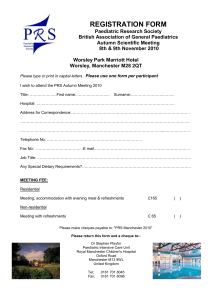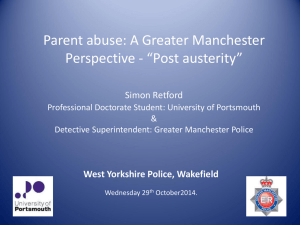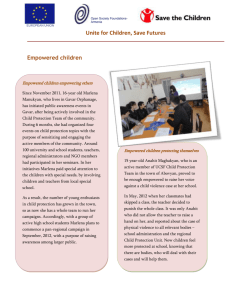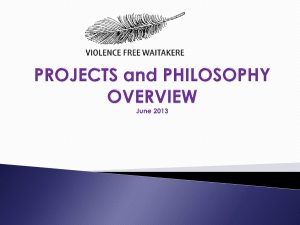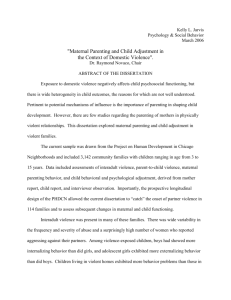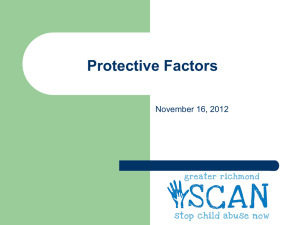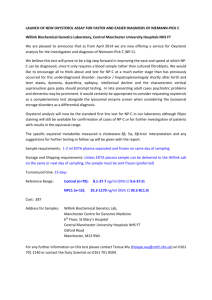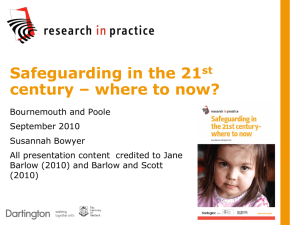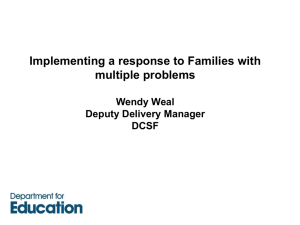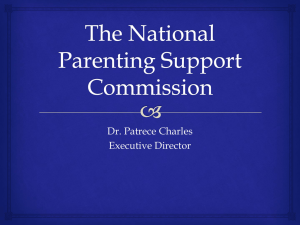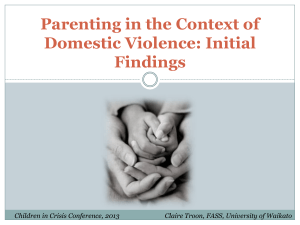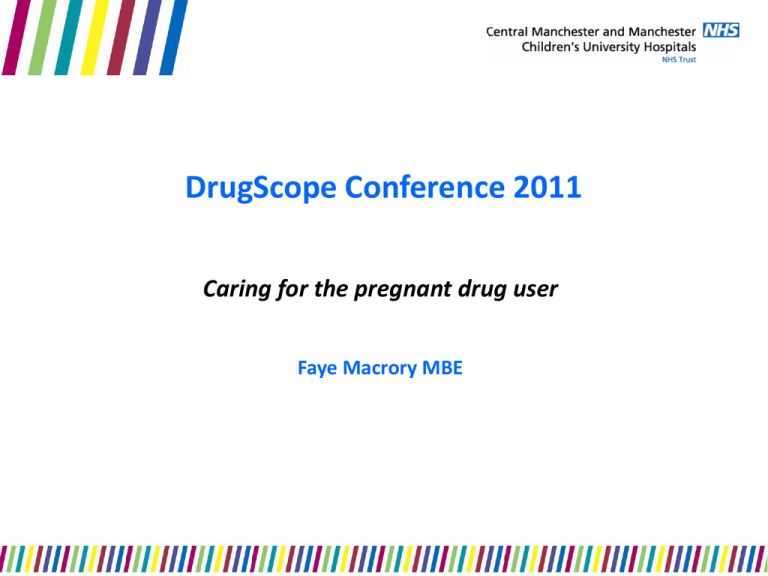
DrugScope Conference 2011
Caring for the pregnant drug user
Faye Macrory MBE
Manchester Specialist Midwifery Service
Consultant Midwife
4 Specialist Midwives
Personal Assistant
drug/alcohol use
mental health/illness
domestic violence/abuse
prostitution/sex work
criminal justice system
safeguarding/child protection
drivers for change:
• Every Child Matters (DFES 2003, 2004)
• Hidden Harm (ACMD 2003, 2006)
• Think Family: improving the life chances of
families at risk (2008)
• Drugs: protecting families & communities.
Action plan (2008-2011)
• Ten Pitfalls and how to avoid them
(NSPCC 2010)
• Safeguarding in the 21st Century - where to now?
(2010)
• The Munro Review of Child Protection: A
Systems Analysis & Interim Report: the child’s
journey (2011)
• Working together: (2010)
• Early Intervention: the next steps (Allen 2011)
• Saving Mothers’ Lives (CMACE 2011)
• NICE SCiP Guideline (110)
references
• Why love matters: how affection shapes a baby’s
brain (Gerhardt, S. 2004)
• Ghosts from the Nursery: tracing the roots of
violence (Karr-Morse, R. & Wiley, M.S. 1997)
• Meeting Multiple Needs: Pregnancy, Parenting
and Dual Diagnosis (Macrory, F). In Rasool G.H.
(ed) Nursing Care of the Dual Diagnosis Patient
(2006
aims and objectives:
• provide appropriate, accessible and family-focused
services to improve health gain
• embrace all aspects of a vulnerable and socially
excluded lifestyle
• to raise awareness of the impact of parental
substance misuse on children and young people
commonly used drugs in the UK include:
•
•
•
•
•
•
•
•
•
alcohol and…………
cannabis (hash & marijuana)
benzodiazepines (e.g. diazepam, temazepam)
opioids (heroin, methadone, dihydrocodeine,
buprenorphine)
hallucinogens (LSD, acid, magic mushrooms)
stimulants (amphetamine, cocaine, ecstasy,
mephedrone & other ‘legal highs’)
cyclizine, ketamine,‘GHB’, amyl-nitrate, anabolic
steroids, anti-depressants, anti-psychotics
volatile substances (gas, glue, aerosols)
OTC drugs – codeine /DFII8
• encourage and enable clients to think beyond
their immediate needs
• emphasis on whole family approach – strengths
and weaknesses
• supporting families to stay together ?
• breaking the cycle……………..
‘……….a proper understanding of our own
beliefs and values is important, as our
attitudes influence the work we
do………..’
Mulleady
(1992)
the challenges ahead:
• addiction & recovery
• relationships & dependency
• death & dying
• love & loss
• mental health
• recognizing the problems
• barriers and obstacles to engagement
• hostile and uncooperative families
• disguised compliance
• setting realistic goals
• initiating/sustaining change
• risk reduction/harm minimization
• confidentiality vs sharing information
• following the pathways
• who to refer to ? how to ?
• escalating concerns
• accountability
• ethical dilemmas
• coping with stress and burn-out
• personal/professional boundaries
• supervision/support & taking care of yourself
parenting assessments:
When does an adult’s
• drug and/or alcohol use
• mental health/illness
• domestic violence/ and abuse
………….pose a conflict of interest within a family?
•
how does parenting capacity become impaired in these
circumstances?
•
what is a child’s capacity to tolerate the changed and
often detrimental care they may receive?
•
when does it pose risks for the safety & well-being of the
child/children?
what about the parent/carer’s:
•
ability to provide a stable and nurturing
environment?
•
sense of responsibility?
•
extended family and wider context ?
•
financial/housing status?
• commitment to maintaining the family?
• health/emotional resources?
• ability to communicate & work together?
• history of violence or conflict?
what about the child’s:
• understanding of the substance misuse?
• exposure to traumatic incidents?
• fears, fantasies & level of confusion?
• is the child socially isolated? bullied?
stigmatized?
• what is the child’s total experience? what
compensatory measures are used?
• is the child the target of the parent’s paranoid
projections? delusions? hallucinations?
challenges for professionals:
• how can these risks be assessed? How can they
be managed?
• who decides when these risks become
acceptable? or unacceptable?
• what services need to be available to meet the
needs of both adults and children in these
circumstances?
• how do those working in these circumstances
need to be trained and supported?
• what can be done to bridge the gulf between
professionals trying to meet the needs of
children & parents?
• how can the different agencies involved ensure
consistent practice & good communication
between each other?
see the adult……
……and see the child
How is it possible to convince a child
of his own worth, after removing him
from a home which is said to be
unworthy, but with whom he
identifies?
Maya Angelou
OPPORTUNITYISNOWHERE
Contact details:
Manchester Specialist Midwifery Service
Zion Community Resource Centre
339 Stretford Road
Manchester
M15 4ZY
Telephone: 0161 226 6669
Fax: 0161 226 7126
Email: faye.macrory@cmft.nhs.uk

